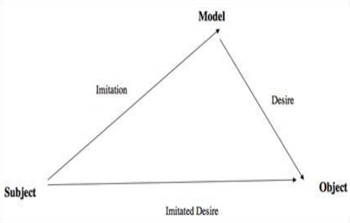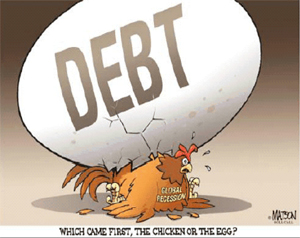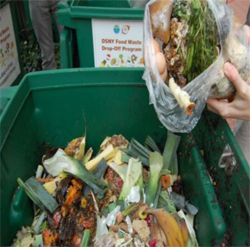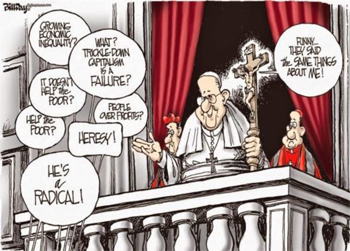by Aidan Hart
René Girard’s theory of ‘mimetic desire’ is built upon the recognition that human beings imitate each other from birth. For the rest of our lives we typically continue to copy or mimic – often subliminally – the desires of others for particular objects or states of being (fame, wealth, expensive car, beautiful body, happiness, holiness, motherhood, popularity, prestige etc). Those copied desires are termed ‘mimetic desires’ in Girard’s theory.  Following the diagram on the right, a person (the subject) imitates another person (the model). The model has desires for particular objects and these desires for those objects are copied by the subject, thus becoming the subject’s own mimetic desires. The person whose desires are being copied (the model) is usually someone of significance (e.g. a parent or teacher) or someone iconic, like a well-know film or TV personality. The objects of desire often have no intrinsic value other than being associated with the model. Some mimetic desires can be good, although some experts on Girardian Theory would argue that since mimetic desires are necessarily competitive they are also invariably violent. However many mimetic desires are clearly destructive, especially when directed to scarce resources, objects beyond affordability by most people, evil ends, manipulated ‘wants’ or to creating a situation of dominance. They then invariably lead, on national and international levels, to structural greed and injustice, escalating and reciprocal violence, civil unrest, rising unemployment, foreign wars, global financial crises and destruction of the environment. For individuals they can eventually lead, if left unchecked, to suicide or to psychological, social and spiritual breakdown, accompanied by a range of obsessive behaviours, addictions and destructive habits.
Following the diagram on the right, a person (the subject) imitates another person (the model). The model has desires for particular objects and these desires for those objects are copied by the subject, thus becoming the subject’s own mimetic desires. The person whose desires are being copied (the model) is usually someone of significance (e.g. a parent or teacher) or someone iconic, like a well-know film or TV personality. The objects of desire often have no intrinsic value other than being associated with the model. Some mimetic desires can be good, although some experts on Girardian Theory would argue that since mimetic desires are necessarily competitive they are also invariably violent. However many mimetic desires are clearly destructive, especially when directed to scarce resources, objects beyond affordability by most people, evil ends, manipulated ‘wants’ or to creating a situation of dominance. They then invariably lead, on national and international levels, to structural greed and injustice, escalating and reciprocal violence, civil unrest, rising unemployment, foreign wars, global financial crises and destruction of the environment. For individuals they can eventually lead, if left unchecked, to suicide or to psychological, social and spiritual breakdown, accompanied by a range of obsessive behaviours, addictions and destructive habits.
Two over-simplified examples might explain Girard’s theory better. A young man has a favourite professional footballer who he admires greatly. He imitates that footballer by playing football himself. He hears his iconic footballer talk about how football fulfilled his desires for fame and wealth so the young man mimetically desires those objects too. After failing to become a skilled footballer the young man realises that he will never have the fame and wealth that he mimetically desires and, in frustration, becomes a football hooligan and starts drinking excessively. A young woman has a favourite film star who she admires greatly and wants to imitate, especially for her beauty. She reads in a glossy magazine interview that the film star, from childhood, had always desired beautiful hair and skin. The young woman then mimetically desires those same ‘objects’ of beautiful hair and skin. After months or years of trying different hair and skin products she realises that she will never have hair and skin like her iconic film star. Depression sets in, followed by eating disorders.
If the young woman in this example were to think rationally she would realise that what she is mimetically desiring is an artificial construct, mostly fabricated by skilled hair stylists or beauticians. The beautiful icon, without all the hair styling and extensions, make-up and fabulous clothes would likely be so plain as to be unrecognisable. For the young man in this example, rational thinking would help him realise that his football skills are never likely to match those of the professional footballer he admires and imitates and so his mimetic desire for fame and wealth will never be fulfilled. Even if his footballing skills did match those of his icon, the fame and wealth they would bring would probably be short lived. He would also realise that his gang violence is as pointless as his excessive consumption of alcohol. But mimetic desires are mostly subconscious and so not always infused with rationality. That is why they are easily manipulated by unscrupulous advertising driven by profit, with little thought to the damage that might result, and by unscrupulous politicians craving popularity and power by promising what they can’t or won’t deliver.
We all have desires and wish lists, in old age humorously called The Bucketlist by Jack Nicholson, in a recent film of the same name. Left unchecked and ungrounded upon reality, they construct a virtual reality around our wants rather than our needs and around our short-term pleasures rather than our long-term well-being. We persist in having them in pursuit of a life built on immediate gratification rather than deferred gratification  through the investment of time and effort to achieve worthwhile goals and a sense of contributing to the common good. It is much easier to day-dream and wish than face up realistically to the unpredictable vagaries of life and its unavoidable hardships and suffering. Rational thinking would dispel the unreality of our George Best or Barbie doll dreams and imitative (mimetic) desires! But rational thinking is avoided to protect a fragile self-image and a false sense of security and importance. Easier to live in the vacuous dreams of virtual reality as portrayed in video games and popular, glossy magazines aimed at young people than in the complexity, hardship and imperfections of lived reality. Mimetic desires disguise the shallowness of the lives they control. In young people they create an obsession with body image, machismo and unrealisable dreams rather than concern with inner realities (spiritual essence) and things of lasting, worthwhile value. Out of control they lead to chaos, psychological, social and spiritual breakdown and suicide.
through the investment of time and effort to achieve worthwhile goals and a sense of contributing to the common good. It is much easier to day-dream and wish than face up realistically to the unpredictable vagaries of life and its unavoidable hardships and suffering. Rational thinking would dispel the unreality of our George Best or Barbie doll dreams and imitative (mimetic) desires! But rational thinking is avoided to protect a fragile self-image and a false sense of security and importance. Easier to live in the vacuous dreams of virtual reality as portrayed in video games and popular, glossy magazines aimed at young people than in the complexity, hardship and imperfections of lived reality. Mimetic desires disguise the shallowness of the lives they control. In young people they create an obsession with body image, machismo and unrealisable dreams rather than concern with inner realities (spiritual essence) and things of lasting, worthwhile value. Out of control they lead to chaos, psychological, social and spiritual breakdown and suicide.
(A clear and succinct description of mimetic desire is contained in the article ‘The Importance of René Girard : I – Mimetic Desire’ by Sean O’Conaill which can be found in the official list of the ACI website’s Articles.)
The Girardian model of mimetic desires, and the harmful effects that often follow from them (described above), can also be applied to countries and to the dreams or mimetic desires of their leaders and politicians. That applies particularly in a situation where one country is seen by itself and others to be head and shoulders above the rest in status,  power and financial prosperity; an icon. That country is America and the dangerous mimetic desires it creates are those fostered by, and flowing from, the American Dream.
power and financial prosperity; an icon. That country is America and the dangerous mimetic desires it creates are those fostered by, and flowing from, the American Dream.
Americans talk a lot about their ‘American Dream’. It is on offer, they say, to all citizens; a dream blessed by God, they say, hence the oft repeated prayer by American politicians at the end of election rallies: “God bless America!” – shouted not as a petition but as a statement of presumed reality that has already been achieved. Underpinning that dream is the American form of capitalism and consumerism. Both of these are lightly regulated to give full reign to the creativity and hard work of the citizens who will realise the dream for themselves and then share in the supposed wealth and happiness it brings in its wake. Other countries mimetically desiring America’s success, status and power feel the need to copy that American form of lightly regulated capitalism and a form of consumerism which encourages the increasing production and consumption of more and more goods and foods. Girard’s model tells us that those mimetic desires, if left unchecked and ungrounded in reality (which they currently are), will lead eventually to internal and external chaos, indigence, increasing poverty, rising unemployment, wars, riots, sporadic violence and crime because they are an illusion; fictitious dreams.
In buying into the American Dream and mimetically desiring its wealth, status and power and thus accepting its lightly regulated capitalism and consumerism as the necessary means to that end, other countries (the majority of developed countries) are ignoring two things which make that mimetic desire the empty dream and grand illusion that it is.
Firstly, the ‘American Dream’ has not brought prosperity, happiness or justice to all its  citizens. The standard of living among Afro-Americans, First-Nation (indigenous) Americans, Hispanic-Americans and many other groups is very low by almost any measure. They are part of the growing number of Americans relying on charity food banks and other hand-outs to survive. The US government’s own figure for poverty among its citizens in 2013 was 45.3 million – 14.5% of the population.
citizens. The standard of living among Afro-Americans, First-Nation (indigenous) Americans, Hispanic-Americans and many other groups is very low by almost any measure. They are part of the growing number of Americans relying on charity food banks and other hand-outs to survive. The US government’s own figure for poverty among its citizens in 2013 was 45.3 million – 14.5% of the population.
The American form of lightly regulated capitalism is not built on ‘the common good’ but mostly on the good of those at the top of society, those with plenty of money. It is built on the false theory of ‘trickle down economics’, whereby, it is said by its advocates (the rich), that the wealth of those at the top of the economic ladder gradually trickles down to those at the bottom and so all benefit. This is a theory formerly supported by Mrs. Thatcher in her days as the UK’s prime minister. History shows that poverty is just as likely to trickle up the economic ladder as wealth to trickle down. Whilst the likes of Bill and Melinda Gates (Microsoft) do distribute some of their wealth philanthropically to worthy causes around the world, they are still worth around $79.2 billion, which is more that the entire wealth of some countries.
For most of America’s super-rich, and most of the  rich people in all countries, the value of their wealth lies not in a love of money in itself nor in a feeling of economic security for them and their children but rather in the social status of its relative size when ranked against the wealth of their friends and acquaintances, of other millionaires and billionaires. Its value is what it does to their egos, and for the super-rich, to their over-inflated self-importance and self-worth through their names appearing each year at the top end of Forbes list of The World’s Billionaires. It is the economics of status-envy. It reveals personalities suffering from capacious amounts of insecurity and lives being lived without spiritual meaning or moral significance; lives being lived with little or no practical and effective concern for social injustice. Token aid, motivated by the self-interest of enhancing the donating country’s image abroad or its opportunity for future business and arms contracts, often perpetuates the grinding poverty and suffering of the poor within the receiving country, increases corruption and ecological damage to the environment.
rich people in all countries, the value of their wealth lies not in a love of money in itself nor in a feeling of economic security for them and their children but rather in the social status of its relative size when ranked against the wealth of their friends and acquaintances, of other millionaires and billionaires. Its value is what it does to their egos, and for the super-rich, to their over-inflated self-importance and self-worth through their names appearing each year at the top end of Forbes list of The World’s Billionaires. It is the economics of status-envy. It reveals personalities suffering from capacious amounts of insecurity and lives being lived without spiritual meaning or moral significance; lives being lived with little or no practical and effective concern for social injustice. Token aid, motivated by the self-interest of enhancing the donating country’s image abroad or its opportunity for future business and arms contracts, often perpetuates the grinding poverty and suffering of the poor within the receiving country, increases corruption and ecological damage to the environment.
Between 2002 and 2007, the income of the richest 1% of Americans grew 10 times faster than the income of the bottom 90%. That trend of income inequality has increased over the years since 1985, further limiting access by large numbers of Americans to fair justice, adequate housing, appropriate health care, quality education at all levels and hence to qualifications for fulfilling employment. Oxfam recently reported that by 2016 1% of the world’s population will own over half the world’s wealth. With unrestrained wealth goes unrestrained power, and that power is often in the hands of a small clique. It is used to gain more wealth by corrupting politics and business.President Obama spent three quarters of a billion dollars on his 2008 presidential campaign, all from personal, but mostly corporate, donations. And whoever pays the piper, calls the tunes!
So free market or lightly regulated capitalism advantages mostly the rich and makes them richer and the rest of society poorer. It creates a vacuous and immoral vision for the future, a vision based on mimetic desires by the masses for unrealisable dreams, copied mostly from politicians and celebrities and built on envy and greed. People are persuaded by the manipulation of clever ‘spin doctors’ employed by governments and leading politicians and by oft repeated sound bites and advertising slogans to support those politicians offering fictitious dreams of wealth, security and well-being. When the vision fails to materialise and the mimetic desires are unfilled, which they inevitably are, society begins to disintegrate. Increasing levels of crime, addiction and loss of identity and purpose result; “Where there is no vision the people perish.” (Proverbs 29:18)
Secondly, by far the majority of countries, including America, are building their national economies on sand and on an illusion; on sand because the economic crisis of 2007-’09 showed just how shaky the world economy was (and still is) and how quickly the banking system in America, a major prop of US and world economies, almost totally collapsed. It also demonstrated how quickly the American financial collapse, like an infectious virus, could spread pandemically around the rest of the world in a matter of days or weeks.
Much of the economic wealth of the majority of  developed countries, including America, is an illusion. It is built on cheap, imported labour and cheap, imported goods from low-wage, developing countries. It is also built on the financial products that make untold billions for investment bankers but are so complex and opaque that few governments can understand them in order to regulate them effectively (e.g. subprime mortgage swaps, collaterised mortgage obligations, short straddle non-directional options trading, buy-sell spread, hedge funds, derivatives etc). Many of these complex financial instruments are basically a sophisticated form of gambling with other people’s money, from which the investment banks, using peoples’ life’s savings and pensions, make massive profits with little risk to themselves.
developed countries, including America, is an illusion. It is built on cheap, imported labour and cheap, imported goods from low-wage, developing countries. It is also built on the financial products that make untold billions for investment bankers but are so complex and opaque that few governments can understand them in order to regulate them effectively (e.g. subprime mortgage swaps, collaterised mortgage obligations, short straddle non-directional options trading, buy-sell spread, hedge funds, derivatives etc). Many of these complex financial instruments are basically a sophisticated form of gambling with other people’s money, from which the investment banks, using peoples’ life’s savings and pensions, make massive profits with little risk to themselves.
Recently, over a two year period, a London City trader, Kweku Adoboli, gambled away £1.4 billion of his customers’ money. And in 1994 Nick Leeson of Barings Investment Bank, lost £208 million through speculative trading (a nice name for investment gambling). They got away with their fraudulent and unauthorised investment-gambling for so long because the investment tools they were using were so complex and opaque that even their own bosses could not understand them and keep track of what was happening. And that is only the banking corruption the public know about because of the spectacular size of their losses and the major loss-of-face and economic threat to their banks. Loss is usually the customers’ loss against their original capital investment.  Fees are normally charged even when the investments decrease in value. When sacked, top executives and bankers often leave with massive pensions and pay-outs. The immorally high salaries and annual bonuses still being awarded to investment bankers and company executives indicate that the practice persists. The Institute for Policy Studies estimated that the $26.7 billion of bonuses Wall Street banks paid themselves in 2013 would be enough to more than double the pay of every one of America’s 1,085,000 full-time minimum wage workers. So a substantial amount of the profit from investment banking, as from most of the largest companies in America and Europe, is going to the already wealthy directors and chief executive officers rather than being equitably distributed among all the workers and small investors. The publication of the massive remuneration to those at the top helps support the myth of great national wealth and of lightly regulated capitalism fairly rewarding everyone.
Fees are normally charged even when the investments decrease in value. When sacked, top executives and bankers often leave with massive pensions and pay-outs. The immorally high salaries and annual bonuses still being awarded to investment bankers and company executives indicate that the practice persists. The Institute for Policy Studies estimated that the $26.7 billion of bonuses Wall Street banks paid themselves in 2013 would be enough to more than double the pay of every one of America’s 1,085,000 full-time minimum wage workers. So a substantial amount of the profit from investment banking, as from most of the largest companies in America and Europe, is going to the already wealthy directors and chief executive officers rather than being equitably distributed among all the workers and small investors. The publication of the massive remuneration to those at the top helps support the myth of great national wealth and of lightly regulated capitalism fairly rewarding everyone.
The supposed wealth of most developed countries is also an illusion because their external national debts are so unbelievably huge that they have to borrow money on a monthly basis or create money (called quantitative easing!) to keep afloat.  America’s national debt currently stands at $18 trillion. The UK’s national debt is currently £1.46 trillion. The Irish national debt for 2014 was €208.2 billion Current government borrowing in the UK runs at about £2 billion a week. Irish borrowing in 2014 was €3.75 billion, although some experts put it much higher. This borrowing is happening because what governments are collecting from all forms of tax and other sources of revenue is not enough to pay off their national debt or even to service its monthly interest payments on their ever-increasing loans. It is termed ‘budget deficit’ but others might call it irresponsible economics which is leading countries to spend money they don’t have or haven’t earned, just borrowed on the ‘never never’. In America the budget deficit for 2014 was $492 billion, in the UK for 2013-’14 it was £107.7 billion. In Ireland it is currently just over € 6 billion. Japan, America and the UK have been running the largest budget deficits among developed nations for many years.
America’s national debt currently stands at $18 trillion. The UK’s national debt is currently £1.46 trillion. The Irish national debt for 2014 was €208.2 billion Current government borrowing in the UK runs at about £2 billion a week. Irish borrowing in 2014 was €3.75 billion, although some experts put it much higher. This borrowing is happening because what governments are collecting from all forms of tax and other sources of revenue is not enough to pay off their national debt or even to service its monthly interest payments on their ever-increasing loans. It is termed ‘budget deficit’ but others might call it irresponsible economics which is leading countries to spend money they don’t have or haven’t earned, just borrowed on the ‘never never’. In America the budget deficit for 2014 was $492 billion, in the UK for 2013-’14 it was £107.7 billion. In Ireland it is currently just over € 6 billion. Japan, America and the UK have been running the largest budget deficits among developed nations for many years.
The result of these massive national debts and annual budget deficits is that many countries, including the UK and Ireland, are still borrowing money each month to pay off the monthly interest payments on previous loans, as well as to have money to keep their economies running, increasingly on a shoe string, and to engage in further spending, particularly for ministerial vanity projects prior to general or local elections. That is fairly similar to a person taking out a second pay-day loan or second credit card to pay the monthly interest due on their first pay-day loan or first credit card and to have more money to spend on more consumer goods they see advertised and feel they can’t do without. It is a recipe for financial disaster. Those massive national debts, budget deficits and continued borrowings are why the supposed wealth of most developed countries is an illusion. Although the above figures are somewhat tentative, due to varying timescales and content attached to the terms in various sources, they are accurate ‘in the round’ and in their general trend. If a business were run like developed countries are running their national finances it would be declared bankrupt and compulsorily closed down!
Basically what national governments are still doing is what individuals did in the early part of this century in buying properties with mortgages  out of kilter with their salaries and savings. Those mortgages were predicated on the economic myth that the value of the properties would invariably keep increasing and so there would always be plenty of money available to redeem the loan, should it ever be necessary, by selling the property at a handsome profit. It was mimetic desire for the objects of ‘the rich’. Ireland, among most other developed countries, suffered badly from that myth! World economies are still playing a version of the old fashioned Ponzi scheme whereby unscrupulous operators pay returns to their investors from new capital paid to the operators by new investors, rather than from genuine profit earned by the operator on previous investments. For governments, this translates into their continuing to borrow large sums of money on which they pay interest from new borrowings. We all know what eventually happens to Ponzi schemes! They collapse and a lot of people loose a lot of money but the unscrupulous operator walks away rich.
out of kilter with their salaries and savings. Those mortgages were predicated on the economic myth that the value of the properties would invariably keep increasing and so there would always be plenty of money available to redeem the loan, should it ever be necessary, by selling the property at a handsome profit. It was mimetic desire for the objects of ‘the rich’. Ireland, among most other developed countries, suffered badly from that myth! World economies are still playing a version of the old fashioned Ponzi scheme whereby unscrupulous operators pay returns to their investors from new capital paid to the operators by new investors, rather than from genuine profit earned by the operator on previous investments. For governments, this translates into their continuing to borrow large sums of money on which they pay interest from new borrowings. We all know what eventually happens to Ponzi schemes! They collapse and a lot of people loose a lot of money but the unscrupulous operator walks away rich.
Modern consumerism is built on producing more and more of everything. This then has to be sold or dumped. In the 80s and 90s over productions of food and milk within the Common Market were often dumped! Now the average UK family dumps a fifth of all the vege tables it buys each week and that is repeated for food in general in most developed countries. Consumerism attempts to sell all that it produces or grows by advertising based on stimulating the mimetic desire of illusionary dreams, copied from media icons, rather than on their real needs. It also does it by building short-term obsolescence into products. This means that consumer goods are either designed to wear out quickly or, more likely – through being heavily adverted – to go out of fashion even more quickly. Visit any local Council waste disposal facility and witness the number of perfectly good, but now considered obsolete or out of fashion, televisions, computers, video recorders, cassette players, music centres, mobile phones, furniture, kitchen and bathroom fittings etc. Charity shops gain a little from the massive disposal of unworn or little worn clothes now considered to be out-of-fashion but the current level of wasteful and mindless ‘retail therapy’ is consuming an increasing amount of declining world resources. Its dumping is polluting many parts of the world. Perfectly good cars are traded in, not because they have reached the end of their useful or trouble-free existence, but because fragile social status and false self-esteem require people to own this year’s latest – and invariably more expensive – model, the one being heavily advertised by celebrities. Modern consumerism is being driven by mimetic desires copied from icons through clever advertising, driving ‘want’ and greed rather than ‘need’. Driven by consumerism, many people the world over have unconsciously made a Faustian pact, trading principles and moral values to secure the unnecessary glitter of their mimetic desires.
tables it buys each week and that is repeated for food in general in most developed countries. Consumerism attempts to sell all that it produces or grows by advertising based on stimulating the mimetic desire of illusionary dreams, copied from media icons, rather than on their real needs. It also does it by building short-term obsolescence into products. This means that consumer goods are either designed to wear out quickly or, more likely – through being heavily adverted – to go out of fashion even more quickly. Visit any local Council waste disposal facility and witness the number of perfectly good, but now considered obsolete or out of fashion, televisions, computers, video recorders, cassette players, music centres, mobile phones, furniture, kitchen and bathroom fittings etc. Charity shops gain a little from the massive disposal of unworn or little worn clothes now considered to be out-of-fashion but the current level of wasteful and mindless ‘retail therapy’ is consuming an increasing amount of declining world resources. Its dumping is polluting many parts of the world. Perfectly good cars are traded in, not because they have reached the end of their useful or trouble-free existence, but because fragile social status and false self-esteem require people to own this year’s latest – and invariably more expensive – model, the one being heavily advertised by celebrities. Modern consumerism is being driven by mimetic desires copied from icons through clever advertising, driving ‘want’ and greed rather than ‘need’. Driven by consumerism, many people the world over have unconsciously made a Faustian pact, trading principles and moral values to secure the unnecessary glitter of their mimetic desires.
The problems with wealth, power and status are their addictive nature. They are also insatiable appetites. Those with hundreds of pounds  look enviously at those with thousands, those with thousands envy those with millions and those with millions envy those with billions. “No one who loves money ever has enough.” (Ecclesiastes 5:9) While the rich inflate their egos by increasing the comparative size of their wealth, governments and politicians tend to inflate their egos by attempting to improve their personal image and that of their country on the world stage; “Our US army is bigger and better equipped than any other army in the world!” (But it lures America into endless conflicts around the world that it cannot win and feed Islamic terrorism.) “We got to the moon before the Russians!” (But it still isn’t clear what concrete and practical gains resulted, commensurate with the massive expenditure of $150 billion in today’s money! It certainly wasn’t the alleviation of American poverty.)
look enviously at those with thousands, those with thousands envy those with millions and those with millions envy those with billions. “No one who loves money ever has enough.” (Ecclesiastes 5:9) While the rich inflate their egos by increasing the comparative size of their wealth, governments and politicians tend to inflate their egos by attempting to improve their personal image and that of their country on the world stage; “Our US army is bigger and better equipped than any other army in the world!” (But it lures America into endless conflicts around the world that it cannot win and feed Islamic terrorism.) “We got to the moon before the Russians!” (But it still isn’t clear what concrete and practical gains resulted, commensurate with the massive expenditure of $150 billion in today’s money! It certainly wasn’t the alleviation of American poverty.)
National mimetic desires, seeking realisation through models of free market (lightly regulated) capitalism and lightly regulated consumerism are dysfunctional, immoral and unjust to a large number of each country’s citizens and to the citizens of other countries, particularly to those in the Third World or developing economies (perhaps better named ‘struggling, poverty-wage economies’). They are the greatest threat to world peace and economic stability.
What can be fairly safely deduced from all this fallacious mimetic desire in America and most other parts of the world, desires stimulated by greed and the lust for insatiable amounts of wealth, power, status and influence, is that it is doing to whole countries what it does to individual people. Its destruction of the soul of nations is leading the world into another global economic and social crisis, perhaps within the next 5 to 10 years. That crisis will be worse than the economic crisis of 2007-’08 and the Wall Street collapse of 1929. It will only take one major economy to default on the payments due on its out-of-control national debt, as happened in Argentina in 2002 when the World Bank estimates that 27.5% of its population were living in extreme poverty (defined as not having enough money to eat properly) and 57.5% of its population were living below the poverty line (defined as the minimum income needed for basic needs including food, clothing, shelter and education.) The only way to avoid, or lessen the impact of the crisis, is for politicians in government to end their mimetic desires for the illusions of the wealth, power and status of The American Dream (built on the American form of lightly regulated capitalism and consumerism) and instead to develop a more socially and morally responsible form of capitalism and eco-friendly consumerism, both based on the common good.
What is required is honest discussion of the issues and for politicians to admit the deep sickness besetting their national economies. However that won’t happen until politicians radically reform the whole political process, substituting grounded reality for mimetic desires, integrity and public service for corruption and self-service, truth for slogans and sound-bites, and credibility in democracy for the cynicism that currently exists among many voters. Capitalism needs to move away from its dualistic thinking about people being either rich or poor, about the poor having to strive to get rich and the rich to strive for even greater riches. Instead it needs to be built on encouraging people at the top and middle of the economic ladder to be satisfied with having enough while raising the standard of living of those at the bottom. That is morally responsible capitalism which, of necessity, will have to bring about radical attitudinal and structural changes within governments and societies around the world. Consumerism will have to build production on environmentally friendly means, on sustainable levels of production and on serving peoples’ real needs rather than on stimulating artificial and pernicious ‘wants’ copied from the mimetic desires inherent in the American Dream and reflected in the lives of those made famous by various parts of the media.
In that cause Christianity has a vitally important role to play. It must witness to all people,  by the quality of individual Christian’s lives and the clarity of its Good News and Gospel values, that Jesus the Christ and His way of unconditional transforming love, justice, mercy and deep concern for the poor and those at the margins of society, are the surest way to personal development, spiritual maturation, individual happiness, sustainable economic growth, world peace, justice and protection of the earth; and that having no grand personal or national image to inflate or vacuous dream to copy is the best image and dream of all.
by the quality of individual Christian’s lives and the clarity of its Good News and Gospel values, that Jesus the Christ and His way of unconditional transforming love, justice, mercy and deep concern for the poor and those at the margins of society, are the surest way to personal development, spiritual maturation, individual happiness, sustainable economic growth, world peace, justice and protection of the earth; and that having no grand personal or national image to inflate or vacuous dream to copy is the best image and dream of all.





Well done!! I agree with everything you’ve had to say Aidan. Despite this, is a “Girardian” society without mimetic desire in our grasp? Is this civilization where no national image to inflate or dream to copy possible? Our culture’s goal is to elevate our “goodness” and what defines this is our “behaviour”. The points you mention construct our behaviour and the architects of this culture believe it to be good but this is not accurate as you point out. A successful model is for “good” to be actually “good” for all. If this were to eventually take hold and become mimetic, the mime now becomes our greatest ally.
Finding this goodness within but more importantly the medium to unleash its potential on the earth is now humanity’s goal.
What is comforting is that your beacon shines brightly. I go by the moniker L.A.M.P. (Lloyd Allan MacPherson) because I’ve been trying to shine this light through video and music (without formally knowing what mimetic desire is) for years. I’d like to share with you the lyrics to a song I wrote in 2006 – it’s called “Conscious” and it certainly speaks to your article :
I’m weary with amazement
With the current state of mind.
Seems harder ever day to feel
Closer to the next great find?
Express questioning is
Provoking an intermittent thought
But is this really how we think
Or how quickly it is sought?
So let’s all celebrate
And let our minds grow
Feel your spirit mounting
Is it really something we don’t know?
Ride the wave – feel its ebb and flow
It’s your conscience.
We are conscious but we don’t know.
And I’m just trying to slow it down
Our somewhat tragic entity
But we keep hurtling at a pace
Of insanity, perpetually
And we only prize our
Rapid acceleration
Yet our state of mental revolt
Calls for spiritual celebration.
So let’s all celebrate
And let our minds grow
Feel your spirit mounting
Is it really something we don’t know
Ride the wave and feel its ebb and flow
It’s your conscience.
We are conscious as you will know.
Thank you L.A.M.P. for your supportive comments.
It is within our grasp as individuals to do something about the situation I describe but it will never totally disappear because it is sinful and sin will always be present in our broken world “hurtling at a pace of insanity” as you so graphically put it. That is why the world and its economic systems are in need of the transforming and redeeming grace of Jesus the Christ, the guidance of His Good News in the Bible and through His Church.
But we must keep trying, keep “riding the wave and feel its ebb and flow” (as you put it so beautifully), keep helping others to embrace Jesus the Messiah as humanity slowly evolves in hope towards the Jardian Omega Point of consciousness in Christ, when He finally draws all things into Himself and redeems the universe.
Your idea of ‘good for all’ is what economic systems should be providing.
The only other question I have is : Are the other associations tackling this subject with as grand an acuity as you folks? If not, certainly challenge them to do so. These are prophetic times we live in and if anything, the impartment of this knowledge on the “adults” of the world is of benefit to mankind especially coupled with the “scapegoating” tendencies associated with this theory.
Try these two websites for interesting articles by people about the same project of reform as ACI:
http://www.associationofcatholicpriests.ie/category/news/
http://ohmygodjournal.org/
Many thanks to Aidan for teasing out the economic application of these ideas on a global scale. His analysis had much the same impact on me as those warnings of the environmental crisis: to wake me up but at the same time to make me feel overwhelmed by the scale of the present dangers. What can I do about this, I ask myself – and the only answer I come up with is ‘pray’.
When Jesus asked the young man to give up all his wealth to follow him he was surely throwing down the ultimate existential challenge. And when the young man refused Jesus did not head after him to put him in a head lock. Instead he suggested that God might find a way of getting through to the wealthy the danger to their souls. Could this be the experience of some personal disaster that wealth could not avert or fix – not that God arranges such things but that he is ready when they happen anyway?
Those complicated financial instruments that now govern so much of the global economic system: a formula for disaster surely. Because I never was entrapped by a housing (or any other) bubble, I am now apparently more solvent than many onetime millionaires. Do the penalties of mimetic excess eventually educate those who fall prey to that? Somehow I feel it is futile to become preoccupied by the mimetic failings of others, and that all we can do is to seek the relationship with Abba that freed Jesus from the mimetic net. It is the Easter joy of the certainty of the victory of the cross that I need to maintain – not the despondency of dwelling in the scale of the mimetic problem.
Thank you Sean. I can appreciate your feeling of being overwhelmed by my analysis of what is happening to national and world finances. I have felt the same myself at times.
I imagine that many of those who have walked away from the Catholic Church in recent years felt similarly overwhelmed, to the point of giving up on it altogether. Their exit was caused by the depth and breadth of the moral laxity and depravity among so many of its clergy at all levels, the injustice of many of its practices and not knowing what they personally could do about it all. That feeling was made worse in the past by the failure of the hierarchy to admit that those problems were present within the Church and its failure to discuss them or to tackle them effectively.
You will be aware that what ACI and others are trying to do is to provide a forum for identifying and discussing those problems. That is a useful outlet for justifiable anger and frustration among those who have remained within the Church. More importantly however, it contributes to creating a much wider awareness of the issues and eventually, hopefully, to a ‘critical mass’ being created around the world demanding fundamental reform and radical renewal that may move those in positions of authority to wake up to what is happening to the Church and to make the necessary changes.
In a similar way, I hope that my article will make its readers more aware of how fragile modern economies are and how corrupting and lacking in social justice modern capitalism and consumerism are also. By becoming aware of the underlying issues one will hopefully listen with a more critical ear to what politicians are telling them and promising them. When called upon to vote they will then be in a position of being better informed.
In the final paragraph I hopefully showed what sincere Christians can do by being seen by the rest of society to be incorporating Gospel values into their own everyday lives (private, social, and business), particularly in their concerns for social justice and practical support for the poor and marginalised in society. As you say, Sean, prayer is an important part of our Gospel-inspired response but should, where possible, be coupled with action. (I’m aware of how involved you are and how committed to practical action.) The Christian role is prophecy and not revolution. That will not bring about radical change overnight. However it will be leaven in society to slowly raise standards and construct an alternative model – a more just and eco-friendly paradigm of social, economic and political activity.
I’m not sure if “mimetic desire” can be prayed away. To me, it’s an education process. Tell the world’s middle class that we are being duped, large scale, due in part to a natural human condition that is being manipulated in the worst version possible by people who are benefiting financially from our innate tendencies. Mimetic desire is a constant feature. Please, if you see someone do good, replicate – desire to be like your fellow man and do good. Yes, personal change is a starting point but spreading this message in every nook and cranny of society is the prophecy (if there ever was one). Sloth, or apathy as it is called in modern times, is a dangerous thing. Prayers should be directed to individuals. Can we really pray for mankind though? Pray that we collectively find the strength. No. I don’t believe that will be enough this time around. You have it all figured out, don’t you? You can easily identify the problems, you know the root cause of the addiction and the importance of a peaceful eviction of those taking advantage of this human condition. What is the plan to expand the message? Prayer? You don’t need to pray in the hope of people understanding. This is not rocket science.
I see prayer in this context as a way of avoiding an ‘us’ versus ‘them’ duality, that makes us a continuation of the problem rather than part of a solution. Prayer helps us avoid the duality and allows us to identify with the whole, while having compassion and love for the whole that we are part of, warts and all.
Martin, you have put the necessary communal, or Kingdom of God vision, for prayer very well. Without that vision our prayer becomes self-centred and we undermine the realisation of the universal Kingdom by removing its spiritual strength in universal prayer.
Really wonderful article, very well written Aidan. The link between Christianity and the economy is certainly an interesting one!
A very informative and engrossing read.
It is indeed shocking and overwhelming to realise just how fragile modern economies are and how corrupting and lacking in social justice modern capitalism and consumerism is. Prayer is a valid and important response as it should help lift us to a new level of consciousness. When it comes to action the maxim that probably applies best is ‘the only thing we can change is ourselves’. With the awareness comes the challenge/responsibility to live simply. Of course some have no choice. And among those of us who do have that luxury, it can be relative, i.e. one person’s simplifed lifestyle is another’s extravagance. But we can only begin from where we are at, building on small beginnings. Maybe we could consider things like, a smaller car; using public transport more; even travelling less; holding on to our gadgets for longer; eating local produce and less meat; not deleting that email but responding to the invitation to join a justice group or ecology group and not just leaving it to others who like that type of thing (anything from animal welfare to tackling the arms trade); considering not just radical giving, but radical relating in some way beyond our own tribe whoever that might be for each of us; etc. You can probably tell that I am speaking from my mid-class comfort zone and with a level of consciousness/awareness that is shamefully low, but as I said we can only start from where we are at. And we have the Gospel and the words of Jesus to call us into new places and constantly inspire us with the dream He called the kingdom of God.
‘Yes!’ to all of that Martin, particularly to the actions you propose; very specific and practical, just what is needed.
I would very slightly modify the saying you mention into ‘Before you can change others you must first change yourself’. I suggest that slight change to emphasise the importance of being a witness to others and helping bring about a community programme of change and not just a programme of change for ‘the self’.
Individualism is an essential part of the current dysfunctional paradigm of national economics, capitalism and consumerism because it doesn’t want to focus on responsibility for the damage that is being done to ‘the other’.
That is one of the big differences between modern societies, where people tend to live individual lives side-by-side and the Kingdom of God where people are called to live as a community of divine love, in ‘joined up’ practical care and concern for each other, gently and constructively influencing and practically supporting each other.
However, I suspect we are in full agreement but using a different form of words.
Good point Aidan. As Richard Rohr says in his Daily Mediation for today, “What Jesus refers to as the Reign of God or the Kingdom of God and what Paul refers to as the Body of Christ is first of all a corporate reality. “Salvation” is taking place systemically, collectively, and historically……” He goes on the say that in Jesus, God is giving us a universal message for the salvation of this world; and that unfortunately “we minimized and trivialized it into a private evacuation plan into another world.”
Yes, Aidan, a resounding yes!!! This is only a “slow evolution” if we let it be but do we have the time for a slow evolution? I made this comment on the ACP site about fertility statistics from the CIA World Fact Book. Catholics in Canada, the USA, most of Europe and certainly Ireland do not have this time.
“Is it short-sighted to think that this “airbrushing” of Catholicism out of Irish life is more than a light sprinkling of paint over a culture or are we seeing a larger, long-term vision of Catholics the world over being erased from history based on current fertility numbers. The U.S. ranks 123rd in the world at 2.01 births per woman on average and Ireland is at 125 at 2 births per woman (1.59 in Canada) – remember, the replacement rate is 2.335 and any factor contributing to this could be considered genocidal (economics comes to mind). Losing courage and confidence in those who oppose the continuance of our culture, heritage and religion is where we Catholics are at right now. How long do we decide to stay here is the question?”
Catholics in Canada, the USA, most of Europe and certainly Ireland do not have the time for a slow evolution.
These numbers are too low for right now. In 50 years, based on current trends, this statistic will continue to decrease. So what’s the plan to end this economic/mimetic nightmare?
I don’t see the Kingdom of God as being about making people Catholics. And God seems to have plenty of time. 13.7 billion years so far, and counting.
Neither do I Martin. Despite this, the Kingdom of God is certainly not about eliminating them from society as we know it. I don’t think I’ve ever made a comment about “conversion”. At the same time, I’ve never openly discouraged people from converting either.
We are creatures of time, Martin, not God. Despite this, the understanding associated with “time healing all wounds” does not include those which are perpetually, self-inflicted, as the article presents. I’ve been on Aidan’s “critical mass” bandwagon. If what is needed is a “confrontation” or a “showdown” to get this ball rolling, I’d be happy to throw my talents into the ring against any to be able to spread this message to its critical mass. I see prayer at a time like this as a personal retreat when apparently, the vacation is over. Then again I’m 42 and work with mostly 20/30-somethings – time is certainly on our side.
Do you remember the new list of 7 deadly social sins? That was a full on invitation to take matters to the next level from Pope Benedict; 4 of the seven include :
4. Polluting the environment
5. Contributing to widening divide between rich and poor
6. Excessive wealth
7. Creating poverty
Pope Francis knows this thing kicks off with an environmental revolution, ending our dependency on foreign oil, or did he choose his name correctly?
Do not forget that there is also a growing Girardian academic awareness, while the unbalanced nature of Catholic moral theology creates a vacuum waiting to be filled. The next step is to move these insights into progressive Christian movements, an awakening to the full revelation of the kingdom of God. The aim could be a Christology in which the non-covetous life of Jesus is fully revealed -embracing even his refusal of political power. Christians trying to find alternatives to Christendom cannot do without an understanding of covetousness as fixated mimetic desire – something that corrupts even the political idealism of the West and makes true equality a constantly elusive mirage.
Sean, I couldn’t agree more. The first Christian movement I would recommend would be within the 13-17 year old Catholic demographic; shortly thereafter, efforts within a secular framework that would assure Girard’s theory spreads universally, as it is universal in nature.
Very well written article.. fascinating